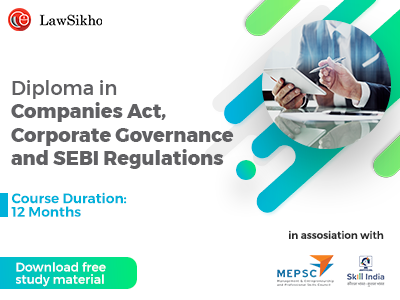This article is written by Amarpal Singh.
Table of Contents
Introduction
There was a lot of unclarity regarding National Company Law Tribunal’s (hereinafter NCLT) jurisdiction to grant dispensation of the meetings of shareholders and creditors in an arrangement or amalgamation. This was due to the conflicting decisions rendered by different benches of NCLT. For instance, in the matter of JVA Trading Private Limited and C & S Electric Limited, NCLT Principal bench, New Delhi had held that NCLT’s power for granting dispensation of the meeting is limited to creditors. Consequently, NCLT cannot dispense the meeting of shareholder.
This article aims to clarify the NCLT’s jurisdiction to grant dispensation from conducting meetings of shareholders and creditors in an arrangement or amalgamation and provide an overview regarding the procedure for filing the application before the NCLT for seeking dispensation of such meetings.
Provisions of Law
Section 230(9) of the Companies Act, 2013 provides for provision for dispensation of meetings as it states that the NCLT in its discretion may dispense the meeting of creditors or any class of creditors when the creditors or any class of them having 90 % of value agree and confirm to the scheme of compromise or arrangement by way of an affidavit.
Additionally, Rule 5 of Companies (Compromises, Arrangements and Amalgamation) Rules, 2016 (hereinafter CAA Rules) state that NCLT after hearing the application under section 230 (1) of the Companies Act, 2013 may dismiss such application if it thinks fit or give directions in respect to determining the class or classes of shareholders or members whose meetings have to be held for approval of the proposed scheme; or dispensing the meeting of classes or class of creditors referred in subsection 9 of section 230 of the Companies Act, 2013.
Judicial Decisions
JVA Trading Private Limited and C & S Electric Limited (2017)
This matter has already been discussed in the introduction in brevity. However, it is important to discuss the matter in detail, due to its significance regarding NCLT’s jurisdiction to dispense the meetings of creditors and shareholder.
Facts
JVA Trading Private Limited (Transferor Company) and C & S Electric Limited (Transferee Company) filed a joint application under section 230 to 232 of the Companies Act, 2013 read with CAA Rules before the NCLT Principal bench, New Delhi in connection to the proposed scheme of amalgamation between both the companies. In the application, it was prayed before the NCLT that it may, either grant dispensation of meeting or pass any necessary order with respect to NCLT convened meeting.
The Transferor company had only 4 shareholders and all of them had given their 100 % consent to the proposed scheme of amalgamation. Therefore, in the application, it had prayed for dispensation with the meeting of members.
Whereas, the Transferee had unsecured creditors to whom the company owed Rs 2,00,000 and they constituted less than 3% in value of the amount owed to unsecured creditors. The representation was made before the NCLT that they are creditors in supplies who will not be prejudiced by the approval of the scheme of amalgamation. The scheme of amalgamation does not in any way seeks to extinguish their liabilities and hence, the company prayed for dispensing with the requirement of sending notices to individual unsecured creditors.
Issue
Whether the NCLT has jurisdiction to entertain applications seeking dispensation of meetings of creditors and members?
Judgement
NCLT relying on the above-mentioned provisions of law held that the provisions do not provide NCLT with the power to grant dispensation of meeting in relation to the shareholders/members. It only empowers the NCLT to dispense the meeting of creditors, if creditors having at least 90 % of the credit value have given their consent to the proposed scheme of amalgamation.
Jupiter Alloys Steel India Limited and Jupiter Wagons Limited (2017)
Facts
In this matter, Jupiter Alloys Steel India (Amalgamating Company) and Jupiter Wagons Limited (Amalgamated Company) filed a joint application before NCLT, Kolkata bench under section 230 to 232 of the Companies Act, 2013 read with CAA Rules for seeking dispensation of the meeting of shareholders. The shareholders of both Amalgamating and Amalgamated company had given their consent to the scheme of amalgamation by way of an affidavit.
Issue
Whether the NCLT has jurisdiction to dispense the meeting of shareholders?
Judgement
It was held in the matter that NCLT is empowered to dispense the meeting of shareholder by virtue of its inherent powers vested in NCLT by Rule 11 of the NCLT Rules, 2016. In the judgement NCLT, Kolkata bench also made an observation that High Courts used to exercise their discretion to dispense the meeting of shareholders under the Companies Act, 2013 and such decisions cannot be ignored.
Re: DLF Phase IV Commercial Developer and Ors. (2019)
Facts
In this matter DLF Phase IV Commercial Developer and Ors. scheme of arrangement/amalgamation was proposed between the following companies:
|
DLF Phase IV Commercial Developers Limited |
Transferor Company 1 |
|
DLF Real Estate Builder Limited |
Transferor Company 2 |
|
DLF Residential Builders Limited |
Transferor Company 3 |
|
DLF Utilities Limited |
Demerged Company |
|
DLF Limited |
Transferee Company |
The demerged company and the transferor companies were wholly-owned subsidiaries of the transferee company (holding company). The companies had filed an application before the NCLT. Chandigarh bench for dispensation of meetings of shareholders, secured and unsecured creditors. The companies in their application had relied on the judgement of Jupiter Alloys Steel India Limited and Jupiter Wagons Limited for the above relief.
However, the NCLT Chandigarh bench rejected the relief and held that the Companies Act, 2013 does not permit dispensation of meetings either in the case of shareholders, secured or unsecured creditors. Section 230 (9) of the Companies Act, 2013 only deals with the dispensation of the meeting of creditors. In the matter consent affidavits of unsecured creditors with respect to the demerged company, and of equity shareholder, secured and unsecured creditors with respect to transferee company had not been obtained. Therefore, even when the scheme is proposed between holding company and wholly-owned subsidiaries, it cannot be ground for dispensation of meetings of shareholder, secured and unsecured creditors.
Subsequently, the above companies filed an appeal before the National Company Law Appellate Tribunal (hereinafter NCLAT).
Issue
Whether the NCLT Chandigarh, bench can ignore the judgement pronounced by a coordinate bench and pronounce a contrary judgement?
Judgement
The NCLAT held that the NCLT Chandigarh bench should have followed the judgement passed by the coordinate or larger benches and dispensed the meetings of shareholder, secured and unsecured creditors in the present matter by taking into consideration that there shall be positive net worth and creditors will not be compromised. Therefore, the order of the NCLT Chandigarh bench was set aside within the purview of per incuriam and sent back for fresh consideration.
Procedure to file an application before the NCLT for seeking dispensation of meetings
The creditors, members, company, or the liquidator in a scenario, where the company is being wound up can file an application before the NCLT for seeking dispensation of meetings. In the case of a company, both the transferor and transferee company would be required to make an application. If both the transferor and transferee fall under the jurisdiction of one NCLT bench, they can also make a joint application. In a scenario, where the transferor and transferee are under the jurisdiction of two different NCLT benches, they will have to file two separate applications.
The application for seeking dispensation of meetings of creditors or members should be filed before the NCLT in Form NCLT -1 as provided in NCLT Rules, 2016 along with the following:
- Notice of admission in Form NCLT -2.
- Affidavit in Form NCLT -6.
- Copy of the proposed scheme.
Additionally, the affidavit should include the following:
- Material facts related to the company such as date of incorporation, share capital, nature of business, whether there is a clause in the constitution documents permitting the company to enter into an amalgamation, merger, or de-merger.
- The latest financial position of the company.
- Latest auditor’s report by the auditor of the company.
- Whether there is any pending proceeding or investigation against the company.
- Reduction of share capital if any, provided in the scheme.
- If any scheme of corporate debt restructuring has not been approved by the creditors 75 % secured in value, in that case, the following shall also be included-
a. Creditor’s responsibility statement in Form CAA 1.
b. Safeguards for protection of other unsecured and secured creditors.
c. Auditor’s report stating that fund requirement after the corporate debt restructuring will conform to the liquidity test as confirmed by the board of the company.
d. A statement in brief, if the company has proposed to adopt corporate debt restructuring according to the guidelines specified by RBI.
e. Valuation report in respect of shares, property, and all assets whether intangible or tangible, movable or immovable of the company by a registered valuer.
7. The applicant should also disclose before the NCLT, method which has been adopted to identify the class of creditor or members for the purpose of approval of the scheme.
Lastly, the application should also be accompanied by fees of INR 5000/- by way of a demand draft in the name of the Pay and Accounts Officer, Ministry of Corporate Affairs (payable at respective date/place).
Conclusion
Through, the above-mentioned judicial decisions, it can be concluded that NCLT has the jurisdiction to grant dispensation with respect to the meetings of creditors and members if the written consent of all the member and creditors is obtained or in a scenario where the scheme is proposed between a wholly-owned subsidiary and holding company.
References
- Anirban Chandran, Power to Dispense with the meetings of shareholders, IndiaCorpLaw (September 17, 2019), https://indiacorplaw.in/2019/09/power-dispense-meetings-shareholders-creditors-scheme-arrangement.html.
- Srikanth Bhaskar, NCLT to exercise its discretion to dispense the matters related to meetings of shareholder & creditors in a scheme of arrangement/ amalgamation (September 9, 2019), https://gamechangerlaw.com/bulletinboard-nclt-to-exercise-its-discretion-to-dispense-the-matters-related-to-meetings-of-shareholders-creditors-in-a-scheme-of-amalgamation-arrangement-nclat/.
- Rahul Maharishi, Analysis of Power of NCLT to grant dispensation from Meetings of Shareholders, Corporate Law Services Group (January 19, 2017), http://vinodkothari.com/wp-content/uploads/2017/02/NCLT_bench_ruling_on_power_to_grant_dispensation.pdf.
LawSikho has created a telegram group for exchanging legal knowledge, referrals and various opportunities. You can click on this link and join:
 Serato DJ Crack 2025Serato DJ PRO Crack
Serato DJ Crack 2025Serato DJ PRO Crack











 Allow notifications
Allow notifications


